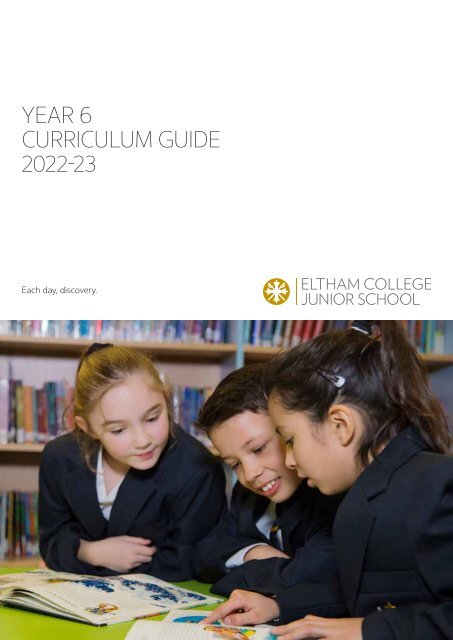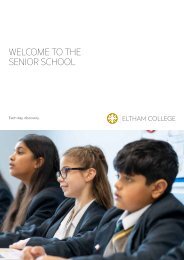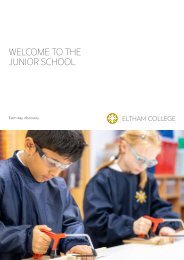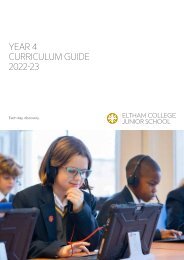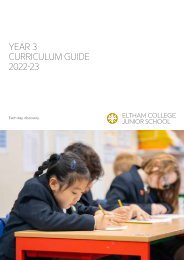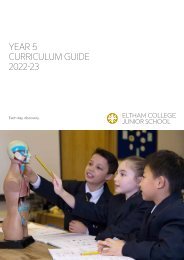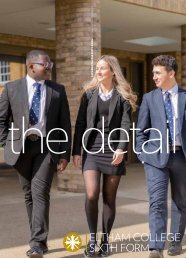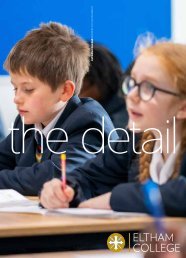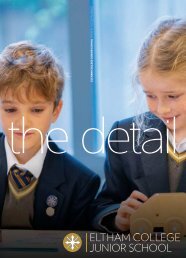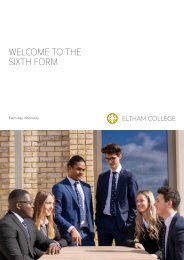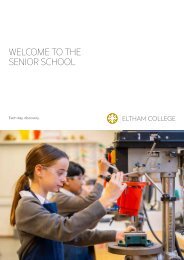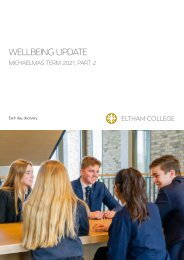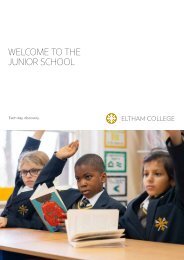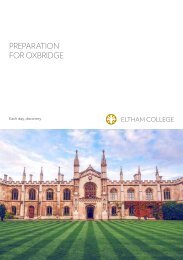JS Curriculum Guide - Year 6 - 2022-23
You also want an ePaper? Increase the reach of your titles
YUMPU automatically turns print PDFs into web optimized ePapers that Google loves.
YEAR 6<br />
CURRICULUM GUIDE<br />
<strong>2022</strong>-<strong>23</strong><br />
Each day, discovery.
Each day, discovery.<br />
02<br />
WELCOME<br />
03 04<br />
SUBJECT TEACHERS<br />
HOMEWORK<br />
05<br />
ENGLISH<br />
07<br />
MATHEMATICS<br />
09<br />
SCIENCE<br />
10 11 12<br />
HISTORY<br />
GEOGRAPHY<br />
RELIGIOUS STUDIES<br />
MUSIC<br />
13 14 15<br />
DRAMA<br />
ART AND<br />
DESIGN TECHNOLOGY<br />
FRENCH<br />
MANDARIN<br />
16<br />
COMPUTING<br />
WELLBEING AND PSHE<br />
17<br />
GAMES, SWIMMING,<br />
AND PE<br />
19<br />
LEARNING SUPPORT<br />
20<br />
COMMUNICATION
Each day, discovery<br />
2<br />
Welcome<br />
Dear parents,<br />
Students at Eltham College Junior School follow a broad<br />
curriculum comprising English, Mathematics, Science, History,<br />
Geography, Religious Studies, Music, Drama, Art & Design<br />
Technology, Modern Foreign Languages, Computing, Wellbeing<br />
and PSHE, Physical Education and Games.<br />
We believe that children learn best when they feel secure and<br />
valued, when they are challenged yet supported, when<br />
challenges are closely matched to potential, and when learning is<br />
partnered with enjoyment. As teachers, we seek to instil in our<br />
students a sense of responsibility, a caring attitude, physical,<br />
mental and emotional resilience, and the ability to adapt to a<br />
competitive and changing world.<br />
The education offered at Eltham College Junior School, both<br />
within the classroom and beyond, has the following aims:<br />
• To offer a broad and balanced range of opportunities for<br />
achievement to all students<br />
• To develop logical, critical and imaginative thinking at the<br />
highest level in each student<br />
• To develop effective use of language, both written<br />
and spoken<br />
• To establish sound foundations of numeracy, mathematical,<br />
scientific and technological understanding<br />
• To encourage creativity through active participation in art,<br />
dance, drama and music<br />
• To enable students to enjoy and develop skills in physical<br />
pursuits and competition and to promote healthy living<br />
• To foster concepts of moral responsibility and to awaken<br />
students to the spiritual dimension of life<br />
• To provide opportunities for the growth of leadership, team<br />
spirit, co-operative tolerance and compassion<br />
• To inspire a love of learning for its own sake and to<br />
value scholarship<br />
• To prepare students to take up places at Eltham College by<br />
building upon the foundations of good learning and<br />
well-established work habits.<br />
This booklet, which is a guide only, has been produced to give<br />
you an overview of the curriculum that your child will study this<br />
year. It is subject to change as we adapt and evolve our<br />
curriculum to ensure its continuing suitability.<br />
May I take this opportunity to wish you and your children a happy<br />
and successful year ahead.<br />
Yours sincerely,<br />
Mrs. Nicki Devon<br />
Deputy Head (Academic)
Subject Teachers<br />
SUBJECT TEACHER CLASS<br />
ENGLISH<br />
MATHEMATICS<br />
Mr Schaper<br />
Mrs Wearmouth<br />
Mr Mitchell-Morgan<br />
Mr Wearmouth<br />
Mr Schaper<br />
Mrs Smith<br />
6WS<br />
6AW/6HM<br />
6WS/6AW/6HM<br />
SCIENCE Mr Mitchell-Morgan 6WS/6AW/6HM<br />
HISTORY Mr Schaper 6WS/6AW/6HM<br />
GEOGRAPHY Mr Schaper 6WS/6AW/6HM<br />
RELIGIOUS STUDIES Mr Schaper 6WS/6AW/6HM<br />
MUSIC Mr Alexander 6WS/6AW/6HM<br />
DRAMA Mr Timbrell 6WS/6AW/6HM<br />
ART & DESIGN TECHNOLOGY<br />
Mrs Dudley<br />
Miss White<br />
6HM<br />
6AW/6WS<br />
FRENCH Mrs Martin 6WS/6AW/6HM<br />
MANDARIN Ms Pan 6WS/6AW/6HM<br />
COMPUTING Mrs Devon 6WS/6AW/6HM<br />
WELLBEING & PSHE Mrs Wearmouth 6WS/6AW/6HM<br />
PHYSICAL EDUCATION<br />
GAMES<br />
Mr O’Dwyer<br />
+ Senior School Games staff<br />
Mr O’Dwyer<br />
Mr Schaper<br />
Mr Wearmouth<br />
Mr Dale<br />
+ Senior School Games staff<br />
6WS/6AW/6HM<br />
6WS/6AW/6HM<br />
Email contacts for form tutors<br />
Mr Schaper<br />
Mrs Wearmouth<br />
Mr Mitchell-Morgan<br />
wls@Eltham-college.org.uk<br />
aec@Eltham-college.org.uk<br />
shm@Eltham-college.org.uk<br />
Please contact your child’s specific subject teacher for feedback about that particular subject, rather than the form tutors.<br />
If you need to make changes to pick-up arrangements, please telephone the office rather than emailing, as an email may not be<br />
picked up in time.
Each day, discovery<br />
4<br />
Homework<br />
Students will normally be given at least 2 nights to complete<br />
homework before it is due in. Homework is set either to reinforce<br />
recent learning, to practise a key skill, or to prepare for future<br />
learning. There may be occasions when a teacher’s professional<br />
judgement dictates that a homework task is unnecessary, but the<br />
weekly timetable will largely adhere to the following structure:<br />
English<br />
English homework is set up to twice a week and lasts<br />
approximately 45 minutes; this is in addition to regular reading<br />
and spelling practice.<br />
Mathematics<br />
Mathematics homework is set up to twice a week and lasts<br />
approximately 45 minutes; this is in addition to regular practice<br />
of times tables and number facts.<br />
Science<br />
Science homework is usually set once a week and lasts<br />
approximately 45 minutes.<br />
Where an English, Maths or Science homework has not been set,<br />
teachers may choose to set homework in another curriculum<br />
subject instead, but this will not usually be in addition to core<br />
subject tasks.<br />
All homework tasks and deadlines will be displayed on<br />
elthamcollege.satchelone.com
English<br />
Reading<br />
Developing confident and motivated readers is a core aim of<br />
English teaching at Eltham College Junior School. The staff and<br />
students share a common love of books and there is a real<br />
culture of reading here. The English curriculum is constantly<br />
evolving, building on its rigorous traditional foundations to create<br />
a cohesive, challenging and up-to-date programme of teaching<br />
and learning with great books at its centre.<br />
Though we expect students to be free readers, teachers are on<br />
hand to guide them to the correct choice of books for their level.<br />
We hear students read on a regular basis as part of classroom<br />
activities and the give extra help where possible.<br />
Students should also be reading every evening at home. Regular<br />
reading aloud helps to develop fluency, comprehension and<br />
expression. We ask that parents assist by reading to and with<br />
their children, listening to them reading aloud, and completing<br />
the reading diary appropriately. Students should also be<br />
encouraged to read silently at home for their own enjoyment.<br />
The library is available at lunchtimes and the use of public<br />
libraries is encouraged.<br />
Comprehension will develop through dialogue, as well as more<br />
formal methods, and fortnightly Let’s Think in English lessons.<br />
LTE, already being used successfully in the Senior School, is a<br />
research-based, cognitive acceleration programme developed at<br />
King’s College, London. It is designed to systematically develop<br />
students’ skills of inference, deduction and analysis and by<br />
introducing the programme at Key Stage 2, we will ensure that<br />
students at EC<strong>JS</strong> are best-placed to meet the challenges of the<br />
Senior School English <strong>Curriculum</strong>.<br />
Writing<br />
Whether they have ambitions to be the next J.K. Rowling, to write<br />
speeches for presidents, or to pen prize-winning theses, the<br />
students’ skills with language will play a crucial role in their future<br />
careers. But good writing doesn’t just come out of nowhere.<br />
Writers of all kinds start their training as prolific and voracious<br />
readers and it is from engagement with high-quality texts that the<br />
students will develop their skills.<br />
They will study a wide range of contemporary and classic texts, as<br />
well as non-fiction, poetry and film. Grammar is explicitly taught,<br />
but it is also embedded within the context of the text being<br />
studied, feeding logically and seamlessly into the students’<br />
creative writing.<br />
Creative writing will be taught through the texts being studied, and<br />
students will be encouraged to proofread, edit and revise their own<br />
work and give feedback to their peers. The students will have clear<br />
models to emulate and a strong purpose for their writing, be it<br />
blogging, performance poetry, or a short story competition.<br />
Spelling<br />
A new online spelling scheme, with practice and application at its<br />
centre, has recently been introduced, and the students will begin<br />
to see the benefits of being taught how to apply learned rules to<br />
unfamiliar words. The students are encouraged to learn words<br />
that follow a particular spelling pattern, but their progress will be<br />
assessed with a weekly dictation exercise, testing application<br />
rather than rote learning.<br />
Handwriting<br />
This is taught using the Collins Handwriting Scheme, which<br />
encourages starting all letters from the line. Correct formation of<br />
letters is taught from <strong>Year</strong> 3, and ‘joined-up’ or cursive writing is<br />
expected in <strong>Year</strong>s 4, 5 and 6. Students in <strong>Year</strong> 6 are expected to<br />
use pen for their written work.<br />
Presentation of Written Work<br />
From entry to the Junior School students will be instructed how<br />
to present their work in their books.<br />
The following guidelines must be followed;<br />
• All students will write in blue ink pen<br />
• Setting out sheets are glued into the front cover of all<br />
students’ books at the start of the school year, in order for<br />
children to understand how their work should be presented<br />
• The date needs to be written on the left hand side of the<br />
page e.g. Monday 13th March and underlined using blue ink<br />
with a ruler<br />
• We expect no graffiti on exercise books, and a high level of<br />
presentation at all times<br />
The following setting out sheet is used as a guide:<br />
This area at the top of the page is not a space to write<br />
in as it has no top line<br />
Tuesday 5th September<br />
‘Title’ or ‘Unit of Work’<br />
1. Start your work here...<br />
2. Miss a line after each answer
Each day, discovery<br />
6
Mathematics<br />
Teaching Arrangement<br />
As in <strong>Year</strong> 5, students will be taught in sets during <strong>Year</strong> 6.<br />
Teaching in sets allows for a smaller group size, and for learning<br />
to be more focused to the particular needs of the individuals or<br />
groups of students within a set. The four sets will generally be<br />
covering the same topics; it may be, however, that one set<br />
spends slightly more or less time on a certain topic, or<br />
approaches the learning from a more practical or abstract<br />
perspective than others, depending on need.<br />
There is a level of fluidity as to which set students are in, and<br />
changes can be made during the year depending on a range of<br />
factors (not purely scores in assessments). Ability levels do<br />
overlap between sets, especially as different children can have<br />
relative strengths in different topics.<br />
Scheme of Work<br />
Calculations<br />
Students will meet, revisit, practise and perfect a range of<br />
calculation methods in all four operations (addition, subtraction,<br />
multiplication and division) over the course of the year. These will<br />
include formal written methods, mental approaches and informal<br />
methods, involving jottings, which support the use of mental<br />
methods over time. The key idea is efficiency - students will be<br />
encouraged to reflect on the numbers involved in a calculation<br />
and choose a method which will lead to the solution efficiently<br />
and securely, rather than always using a certain method<br />
whatever the problem.<br />
Mental Maths and Times Tables<br />
Students will receive regular informal mental Maths tasks<br />
-designed to identify areas for extra practice and development<br />
- as well as informal check-ups of times table knowledge. As well<br />
as instant recall of all times table facts, students should be<br />
increasingly able to recall square, cube and prime numbers<br />
under 100 from memory.<br />
Problem-Solving<br />
Much mathematical content is learned or applied through<br />
problem-solving. As such, students will be given opportunities to<br />
use their ‘problem-solving toolkit’ regularly, involving skills such<br />
as: talk it through; make a list; try a simpler case; trial and<br />
improvement; draw a diagram; find a rule or pattern; use a<br />
system; act it out.<br />
Explicit reference to these strategies within lessons will give<br />
students confidence to identify and use them in their own<br />
independent problem-solving. Students should be confident<br />
to explain and prove mathematical patterns using<br />
appropriate language.<br />
Maths topics to be covered<br />
In <strong>Year</strong> 6 the use a textbook called “Mathematics - <strong>Year</strong> 6”<br />
produced by Galore Park. It is designed to support transition<br />
from Key Stage 2 to Key Stage 3 Maths content – studying and<br />
revising topics from the <strong>Year</strong> 6 curriculum scheme of work while<br />
introducing some concepts which will be covered in more detail<br />
in <strong>Year</strong> 7.
Each day, discovery<br />
8<br />
A SUMMARY OF THE TOPICS COVERED IN THE TEXTBOOK IS BELOW:<br />
• Investigations with numbers (identifying patterns and finding general solutions)<br />
• Working with numbers (place value, ordering, rounding, estimating, mental arithmetic, order of operations)<br />
• Calculations (formal written work in all four operations)<br />
• Angles and triangles (types of angles, measuring angles, angles in a triangle, calculating angles)<br />
• Number puzzles (missing operations, using symbols, function machines, sequences)<br />
• More about numbers (index numbers, squares, roots, multiples, factors, primes)<br />
• Fractions (lowest terms, ordering, adding, subtracting)<br />
• Ratio and proportion (finding the ratio, using ratios, using proportions, ratio and scale)<br />
• Congruent and similar shapes<br />
• Decimals (money, rounding, adding, subtracting, multiplying, dividing, remainders)<br />
• Fractions, decimals and percentages (converting one to another, recurring decimals)<br />
• Finding fractions of an amount (fractions of a whole)<br />
• Percentages (percentage of an amount, percentages to fractions)<br />
• Negative numbers (adding and subtracting)<br />
• Transformations (negative co-ordinates, reflection, rotation, translations)<br />
• Formulae (brackets, order of operations)<br />
• More fractions (multiplying a fraction by a whole number, multiplying a fraction by a fraction, dividing a fraction by<br />
a fraction)<br />
• Time and travel (units of time, 24-hour clock, speed, distance, time)<br />
• Line graphs (analyzing and drawing line graphs, conversion graphs)<br />
• 2D shapes (regular and irregular, symmetry, properties of quadrilaterals, polygons, circles)<br />
• Pie charts and tables (analyzing and drawing pie charts and bar graphs)<br />
• Perimeter and area (regular and irregular shapes, triangles, missing lengths)<br />
• 3D shapes (capacity, volume, formula, missing lengths)<br />
• Averages (range, mode, median, mean)<br />
The resources and lessons from this textbook are supplemented<br />
by a variety of other engaging and relevant tasks, in order to give<br />
students the chance to develop their conceptual understanding<br />
of topics as well as applying them in problem-solving and<br />
structured practice situations.
Science<br />
We have devised our own exceptional scheme of work for<br />
Science, which provides excellent coverage of The National<br />
<strong>Curriculum</strong> as well as incorporating additional strands. The<br />
students learn about a wide range of living things, materials<br />
and physical<br />
phenomena. They make links between ideas and explain things<br />
using simple models and theories.<br />
They apply their knowledge and understanding of scientific ideas<br />
to familiar phenomena, everyday things and their personal<br />
health. They think about the effects of scientific and<br />
technological developments on the environment and other<br />
contexts. They carry out more systematic investigations, working<br />
on their own and with others.<br />
The students use a range of reference sources in their work.<br />
They talk about their work and its significance, using a wide<br />
range of scientific language, conventional diagrams, charts,<br />
graphs and ICT to communicate their ideas.<br />
Science work in the Junior School is focused on experiment,<br />
investigation and practical observation. Our scheme of work<br />
provides students with a clear knowledge and skills focus.<br />
Programme of Study<br />
Topic 1: Working Scientifically<br />
• Identifying variables<br />
• Making predictions and writing conclusions<br />
• Developing methods and drawing scientific diagrams<br />
• Evaluating our experiments<br />
Topic 2: Human Body Systems<br />
• Circulatory system<br />
• How the heart works<br />
• Role of blood<br />
• Water in our bodies<br />
Topic 3: Keeping Healthy<br />
• Being healthy<br />
• Food groups<br />
• Pulse rate and exercise<br />
• Effect of exercise<br />
• Effects of smoking and drugs<br />
Topic 4: Light<br />
• How light travels<br />
• Exploring mirrors<br />
• Making a pinhole camera<br />
• Lenses<br />
• The colour spectrum<br />
• Investigating shadows<br />
Topic 5: Electricity<br />
• Changing circuits<br />
• Drawing circuit diagrams<br />
• Resistance<br />
• Testing circuits<br />
• Generating electricity<br />
• Making an alarm<br />
• Presenting and evaluating a design<br />
Topic 6: Living Things<br />
• Making classification keys<br />
• Grouping living Wings<br />
• Habitats<br />
• Micro-organisms<br />
• Recording observations<br />
• Variation of living Wings<br />
• Improvement of crops<br />
• Environmental impact on living Wings<br />
• Extinction<br />
• Natural selection and evolution
Each day, discovery<br />
10<br />
History<br />
Autumn Term<br />
• The students will begin with work linked to the Victorians,<br />
with a particular focus on local History, including the History<br />
of Eltham College – but also exploring and investigating<br />
influential people who had an impact on children’s<br />
education during that era, as well as the development of<br />
Britain as a major power around the world, through the<br />
Industrial Revolution.<br />
Spring Term<br />
• In the Spring term, the students will be studying Britain<br />
since 1930, focusing on the Second World War. This ties in<br />
with their English study. They will find out about aspects of<br />
life for children in war-torn Britain such as being an evacuee<br />
and living on rations.<br />
Summer Term<br />
• Students will be given the opportunity to research and<br />
create a project, which has a local geographical element to<br />
it, focusing on a specific aspect/person/event relating to the<br />
Victorians or the Second World War.<br />
In addition, drama workshops and visits to relevant places are<br />
arranged each term. The students will also be able to experience<br />
a range of hands-on workshops that take place in school. There<br />
will sometimes be the option to dress up for these workshops,<br />
which is encouraged but not compulsory.
Geography<br />
Autumn Term<br />
• The students will be studying global and environmental<br />
issues including global warming, desertification, freshwater<br />
scarcity, green energy and possible solutions to some of<br />
these issues.<br />
Spring Term<br />
• Class work will involve a study of natural disasters including<br />
hurricanes, tornadoes, earthquakes, Tsunamis, volcanic<br />
eruptions, flooding, etc.<br />
• The students will also study extreme climate conditions<br />
from around the world.<br />
Summer Term<br />
• The students will be given an opportunity to study the<br />
continent of Africa.<br />
• The lessons will focus on the different climates, landscapes<br />
and wildlife located in different areas of the continent and<br />
how those animals have evolved and developed ways to<br />
adapt to their environments.<br />
• The students will also continue to work on and develop their<br />
note-making skills and expanding their independent<br />
research skills – some of which will be used with their local<br />
History project that will take place earlier in the term.<br />
Religious Studies<br />
Students learn about Christianity and another of the other main<br />
world religions, recognizing the impact of religion and belief<br />
locally, nationally and globally. They make connections between<br />
differing aspects of religion and consider the different forms of<br />
religious expression. Students consider the beliefs, teachings,<br />
practices and ways of life central to religion. They learn about<br />
sacred texts and other sources and consider their meanings.<br />
Students learn about similarities and differences both within and<br />
between religions and beliefs and the importance of dialogue<br />
between them. They extend the range and use of specialist<br />
vocabulary and will have the opportunity to communicate their<br />
ideas, recognizing other people’s viewpoints. They consider their<br />
own beliefs, values, and those of others in the light of their<br />
learning in religious education.<br />
Our assemblies deal with many issues, often through<br />
weekly themes.<br />
We also study:<br />
Autumn Term<br />
• An introduction to Philosophy<br />
• Identity<br />
Spring Term<br />
• Evil and suffering<br />
• Life after death<br />
Summer Term<br />
• Religion in the UK<br />
• Planet Peace
Each day, discovery<br />
12<br />
Music<br />
In Music, classwork will reinforce the skills of performance,<br />
composition, listening and appraising. These elements will be<br />
taught through songs and practical activities, helping students<br />
to consolidate and develop their knowledge of the key<br />
musical concepts.<br />
They will also have regular singing sessions. In these, students<br />
will extend their repertoire of assembly songs and hymns as well<br />
as learning a selection of light-hearted songs. They will develop<br />
their understanding of how the voice is produced and managed<br />
through a series of vocal activities.<br />
Students can participate in the <strong>Year</strong>s 5 and 6 Choir. Some will be<br />
invited to join ensembles by Heads of Section.<br />
Scheme of Work<br />
Autumn Term<br />
• Minimalism and early C20 composers<br />
• Theme and Variation form is studied using Elgar’s Enigma<br />
Variations to illustrate the form<br />
• Melody writing and chord progression is analyzed<br />
• Comparing Requiems from different countries and eras<br />
• Christmas carol composition<br />
• Preparation for Christmas concerts and services<br />
Spring Term<br />
• Preparation for The Inter-House Music Competition<br />
• Performance skills are developed<br />
• Jingles and music in advertising are studied<br />
• <strong>Year</strong> 6 Song Writing Competition using MusicFirst software<br />
Summer Term<br />
• Film scores<br />
• Jazz and Blues<br />
• Preparations for Summer Concert
Drama<br />
Throughout their time at Eltham College Junior School students<br />
will learn the key elements of Drama including Storytelling,<br />
Devising, Improvisation, Stanislavski and The System, Method<br />
Acting, Actioning and Playwriting. This will allow them to develop<br />
a range of skills within the ‘Core Learning Outcomes’ of Drama;<br />
Performance, Creativity and Reflection. They will explore a wide<br />
range of characters, texts and techniques whilst gaining<br />
confidence and developing their performance skills.<br />
The bespoke curriculum will lay the foundations for Drama as a<br />
subject, which will set them up with the tools and experience<br />
needed to pursue Drama in the Senior School and beyond. They<br />
will have regular opportunities to use these skills while working<br />
towards performances. Lessons will be highly interactive,<br />
physical and collaborative. Lessons will also incorporate elements<br />
of the pupils’ study in other areas of the curriculum. Productions<br />
will happen for each year group once a year and will give each<br />
pupil the opportunity to experience a production process and<br />
live performance. Productions will include Shakespeare, Chaucer<br />
in Performance, Fairytales and Poetry in Performance.<br />
Scheme of Work<br />
Autumn Term<br />
• Improvisation<br />
• Introduction to Practitioner Work: Stanislavski and<br />
The System - Harry Potter and the Cursed Child<br />
Spring Term<br />
• House Fireside – Sketch Comedy<br />
• Actioning: The Modern Actor<br />
Summer Term<br />
• Chaucer in Performance<br />
• <strong>Year</strong> 6 Production: The Canterbury Tales
Each day, discovery<br />
14<br />
Art and<br />
Design Technology<br />
They spend half a term on design technology projects and half a<br />
term on Art during The weekly timetabled lessons. This allows<br />
students time to develop their projects in greater depth. Whilst<br />
there is an overlap between Art and Design Technology, DT<br />
focuses on the design and making process of a product with a<br />
use or purpose and Art focuses on creating and responding to<br />
stimulus and developing creative skills.<br />
Art<br />
In Art lessons, students develop their creativity and imagination<br />
by experimenting, inventing and creating their own varied works<br />
of art using a range of materials They will learn how to draw,<br />
paint, sculpt and explore other art, craft and design techniques.<br />
Students are introduced to a wide range of media including<br />
paint, pastels, clay, collage, printing and textiles. They also have<br />
the opportunity to discover the work of great artists from<br />
different cultures and use their work as inspiration for their own<br />
pieces. They will have the chance to visit a gallery.<br />
Students create sketch books to record their learning and to<br />
explore and review ideas.<br />
Scheme of Work<br />
The scheme of work for this academic year is focused on the<br />
inspiration of artists from different eras and using different styles<br />
of art.<br />
<strong>Year</strong> 6 Projects<br />
• Banksy<br />
• Andy Warhol<br />
• Seurat<br />
Design Technology<br />
They spend half a term on Design Technology projects and half a<br />
term on Art. This allows the students to develop their projects in<br />
greater depth. Students work on their own and as part of a team<br />
on a range of designing and making activities. They think about<br />
what the products are used for and the needs of the people who<br />
use them.<br />
They plan what has to be done and identify what works well and<br />
what could be improved in their own and other people’s designs.<br />
They draw on knowledge and understanding from other areas of<br />
the curriculum and use computers in a range of ways.<br />
This year, the students build upon their knowledge of the design<br />
process and use each stage of it to support their ideas for<br />
solutions to everyday problems. The students also learn how to<br />
record and annotate elevations so that they are able to be used<br />
as a blueprint for construction.<br />
This year our projects will be based around the following areas:<br />
Textiles<br />
• The children will work with different textures, materials, and<br />
mediums to create a Japanese Koi Kite.<br />
Mechanical Systems<br />
• Design development – Using CAD<br />
• Understanding cam mechanisms.<br />
• Creating a product to fit a given design brief.<br />
Structures<br />
• Techniques for reinforcing and strengthening a 3D<br />
framework.<br />
• Communicate ideas through exploding diagrams,<br />
prototypes and CAD.
French<br />
In <strong>Year</strong> 6, students will deepen their knowledge of French in<br />
order to equip them with a bank of language to assist them on<br />
their four-day trip to France in Term 3. This will build on the solid<br />
foundations established in <strong>Year</strong> 5 to foster confidence and<br />
independence when speaking French.<br />
Topics include:<br />
• Present Tense Verbs<br />
• In town<br />
• Directions<br />
• Shopping at the market<br />
• Prices and the Euro<br />
• Ordering food and drink<br />
• Festivals and Celebrations<br />
The aim to develop the skills necessary for effective language<br />
learning, enabling them to spot rules and patterns to apply to<br />
their own spoken French, thus preparing students for the<br />
transition to Senior School. Strong emphasis is placed on<br />
listening and speaking during lessons, whilst written accuracy is<br />
developed during class time. Games, song, video and learning<br />
technology are integrated throughout the curriculum to support<br />
and contextualise learning.<br />
Mandarin<br />
In <strong>Year</strong> 6, students have one Mandarin lesson of 40 minutes per<br />
week. During the first term, students learn or consolidate<br />
previous knowledge and then they continue learning the topics<br />
as listed below in more depth throughout the course of the year.<br />
Their language knowledge and four skills (speaking, listening,<br />
reading and writing) will continue to be enhanced by exploring<br />
the Chinese language and culture through a range of<br />
project-based activities, culture related lifestyle, events and<br />
festivals, and comparing it to their home countries.<br />
The students are encouraged to continue applying the key<br />
elements of Mandarin language including Pinyin, character<br />
writing and grammar rules in their learning. They develop a good<br />
foundation of the language system and can apply this when they<br />
communicate in Mandarin for their own uses. Songs, stories,<br />
dialogues, role plays, games, arts and crafts, videos and ICT<br />
based tasks related to their age and level will be integrated into<br />
the lesson activities.<br />
Topics include:<br />
• Introduce oneself and one’s family<br />
• Number, days and date (to tell one’s birthdate)<br />
• Colours and pets<br />
• Chinese New <strong>Year</strong> story and celebration<br />
• Visit a restaurant<br />
• My favourite sport
Each day, discovery<br />
16<br />
Computing<br />
In <strong>Year</strong> 6 the students develop the following skills and knowledge:<br />
General Technological Awareness<br />
• To be able to use a range of hardware and software independently<br />
• To be able to select an appropriate piece of hardware or<br />
software to carry out a specific task<br />
Programming<br />
• To understand and use These key terms when coding:<br />
Sequencing, Algorithm, Decomposition, Selection,<br />
Abstraction, Debugging<br />
• To adapt Their knowledge of block-based coding in Scratch<br />
to write programs using MakeCode<br />
• To use MakeCode and the Micro:bit to explore physical<br />
computing, including a variety of inputs and outputs<br />
• To begin to use text based programming languages e.g.<br />
Python or Small Basic<br />
Internet Safety<br />
• To know how to act safely and responsibly online<br />
• To understand what a digital footprint is<br />
• To have an understanding of cyberbullying and how to<br />
manage any issues they may experience<br />
Digital Literacy<br />
• To be able to create videos using editing software<br />
• To be able to select an appropriate program or app to carry<br />
out a specified task<br />
• To send and receive e-mails via the Outlook app in Office 365<br />
• To use e-mails responsibly<br />
• To attach a document to an email<br />
• To be able to use the Forms app in Office 365 to<br />
write questionnaires<br />
• To gain confidence at using the Office 365 suite to save,<br />
share and edit documents<br />
• To become proficient at touch typing<br />
Understanding Technology<br />
• To be able to evaluate technology<br />
• To gain an understanding of how computer networks operate<br />
• To know the difference between the Internet and the<br />
World Wide Web<br />
Wellbeing and PSHE<br />
In Wellbeing & PHSE (Personal, Social and Health Education)<br />
lessons the students will continue to look at, and develop, themes<br />
concerning their own personal Wellbeing and that of others.<br />
The Wellbeing & PHSE programme is flexible and will often be<br />
guided by issues that arise in the class or school. The <strong>Year</strong> 6<br />
Wellbeing & PSHE Programme of Study focuses on preparing<br />
the students for their transfer to Senior School and the greater<br />
degree of independence they will have in their lives.<br />
Relevant topics/subjects from the media may also be discussed<br />
where appropriate.<br />
Some <strong>Year</strong> 6 students will also be trained to take on the role of<br />
Peer Mentors, enabling them to help out the younger children at<br />
break times.<br />
The following topics will be looked at in PSHE:<br />
• Me and My Relationships (includes feelings, emotions,<br />
conflict resolution and friendships)<br />
• Valuing Difference (includes British Values focus)<br />
• Keeping Myself Safe (Includes aspects of safe internet use,<br />
drugs and Relationships Education)<br />
• Rights and Responsibilities (includes money, living in the<br />
wider world and the environment)<br />
• Being My Best (includes keeping healthy, growth mindset,<br />
goal setting and achievement)<br />
• Growing and Changing (includes RSE related issues)<br />
During the year our School Nurses, Annie Brooke and Catherine<br />
Baker, will be taking the students for sex education lessons,<br />
which will include puberty in boys and girls and how the media<br />
portray relationships and gender roles.
Games, Swimming,<br />
and PE<br />
The sports studied in Games lessons are:<br />
Autumn Term<br />
Rugby<br />
• Boys in <strong>Year</strong> 6 will play full contact rugby as per the new<br />
continuum rules.<br />
• Team sizes have been reduced as per the RFU requirements<br />
to a maximum of 9 a side.<br />
• Boys are not assigned positions to enable them to<br />
experience a broad range of skills.<br />
Skills taught in Rugby are:<br />
• Passing (spin and non-spin, from hand and from floor),<br />
receiving, off-loading (from feet and from ground.)<br />
• Tackling (side, front and rear.)<br />
• Evasive running skills, lines of running, support lines.<br />
• Rucking and mauling.<br />
• Stealing opposition ball (tackling)<br />
• Kicking from hand and fielding of kicks<br />
• Game management<br />
A select group of approx. 24 students have been invited to<br />
participate in an after school elite rugby training session with<br />
Mr Thomas & Mr O’Dwyer on a Thursday night from 4 till<br />
approximately 5:30pm up until half term.<br />
Spring Term<br />
Both Hockey and Football are taught this term with Hockey<br />
weighted most heavily in line with the major sports in the<br />
Senior School..<br />
Skills taught in Hockey are:<br />
• Passing (push, slap and hitting.)<br />
• Receiving the ball (both static and on the move.)<br />
• Tackling<br />
• Shooting<br />
• Ball distribution and match play.<br />
• Dribbling and evasive skills (open stick and Indian dribbling,<br />
rollouts, etc)<br />
A select group of approx. 28 students from <strong>Year</strong> 5 & 6 have been<br />
invited to participate in an after school elite hockey training<br />
session with staff from the Senior School on a Thednesday night<br />
from 4 till approximately 5:30pm. This runs the entire year<br />
(including the Autumn Term.)<br />
Skills taught in Football are:<br />
• Passing (inside and outside of foot, along the floor, in the air.)<br />
• First Touch<br />
• Shooting<br />
• Tackling<br />
• Ball distribution and match play.<br />
Summer Term<br />
Cricket is taught this term.<br />
Lessons are divided between net sessions where there is specific<br />
focus on battling and bowling and sessions on the square where<br />
match play, field positions and fielding techniques are taught.<br />
Skills taught in Cricket are:<br />
• Bowling (focus on accurate technique aiming to produce a<br />
consistent action.)<br />
• Batting (correct grip, stance and footwork, calling, backing up)<br />
• Throwing (underarm and overarm.)<br />
• Fielding skills (long barrier, backing up, etc)<br />
• Fielding positions and match play<br />
PE Swim<br />
In PE Swim lessons, groups are organised based upon<br />
swimming ability into three or four groups. Groups then<br />
alternate between a land-based activity and water-based.<br />
Beginner swimmers may find that they receive extra time in the<br />
pool to develop this key life skill.<br />
Other activities will include, basketball, athletics, HRF, softball<br />
and tennis for beginner players.<br />
In the Autumn Term the students play basketball<br />
Skills taught in Basketball are:<br />
• Passing (bounce and chest)<br />
• Receiving, shielding and pivoting.<br />
• Shooting (lay-up and set shot)<br />
• Dribbling<br />
• Match play and game management.
Each day, discovery<br />
18<br />
In the spring term the students partake in a series of health and<br />
fitness tests and activities. These include: The Bleep Test, Timed<br />
Shuttle Runs, Circuits, SAQ (Speed, Agility, Quickness) activities<br />
(ladders, hurdles, etc.)<br />
In the summer term the students are taught, and their scores<br />
recorded in, a number of athletic activities including, short-,<br />
middle- and long-distance running, long jump and turbo javelin.<br />
Beginner tennis players (those who do not receive coaching<br />
outside of school) will also have the opportunity to sign up for<br />
coaching sessions with an outside coach during PE lessons in the<br />
summer term. Details of this will be sent to you in the spring term<br />
via the school office.<br />
There are also a wide variety of co-curricular activities that you<br />
may enroll your child in. A list of clubs is available from the<br />
school office.<br />
Team Selection<br />
The Junior School plays competitive fixtures against local schools<br />
in the major school sports (rugby, football, cricket and hockey)<br />
and in a selection of minor sports as well (tennis and swimming.)<br />
Over recent years an effort has been made to extend our fixture<br />
card in the major sports by increasing the number of teams<br />
participating in fixtures which in turn increases the opportunities<br />
for students to represent the school.<br />
At the start of each term, the students are placed into mixed ability<br />
groups to enable all students to be assessed by the members of<br />
staff responsible for running the teams in each year group.<br />
Students that have played for a particular team in a previous year<br />
are not guaranteed a place in that team the following year. All<br />
students are assessed on where they are at that point in time and<br />
not based upon historically which team they have represented.<br />
This enables all students to feel that the selection process is<br />
open and transparent and that team selection is not automatic<br />
from one year to the next.<br />
If a student is not selected for a team that they have represented<br />
the previous year, the teacher responsible for the coaching of<br />
that team will endeavour to provide constructive feedback to the<br />
student in question to enable them to further develop their skills<br />
so that they understand what aspects they need to focus on.<br />
Throughout the term there is scope for students to move<br />
between groups. Members of staff meet regularly to discuss the<br />
progress of individuals in their group and discuss their merits.
Learning Support<br />
The aim of the Learning Support provision within Eltham College<br />
Junior School is to identify and support students with specific<br />
learning difficulties through a whole school approach, whilst<br />
working in partnership with parents and any other relevant<br />
outside agencies. ALL teachers are teachers of children with<br />
specific learning difficulties.<br />
Specific Learning difficulty<br />
identification procedure<br />
Children may require learning support either throughout or at<br />
any time during their career at the Junior School. We aim to<br />
provide targeted support to those with identified needs who join<br />
the Junior School and investigate and support those whose<br />
needs are identified whilst they are at the school.<br />
The process is as follows:<br />
Identification from a previous school<br />
A Student may have an EHCP, an EP report, be in the process of<br />
being assessed by an external body or have other relevant<br />
reports. Once a pupil has received a diagnosis a pupil passport<br />
including targets will be written, in consultation with the form<br />
tutor and parents. Targets will be updated on a termly basis or<br />
more frequently if necessary.<br />
Identification at any other stage<br />
A concern may be identified by a form tutor/subject teacher or<br />
parents at any time. The Head of Learning Support will carry out a<br />
computerised screening programme, primarily to identify Dyslexia<br />
as well as conduct classroom observations. This screening can take<br />
place at any point within the school year. Parents will be notified of<br />
the results, a meeting will be arranged to discuss the findings and<br />
the child will be monitored and supported within class. If no<br />
evidence of a special educational need is found, the student will be<br />
kept under close observation by the form tutor. At this stage, they<br />
may also begin on a short booster programme in English or Maths.<br />
If evidence of a learning difficulty is found, a further meeting will be<br />
held with parents, and the student will be referred to an EP or other<br />
professional for formal assessment. A pupil passport will then be<br />
written and support will be offered in line with the<br />
recommendations made.<br />
Targets will be reviewed on a termly basis by the Head of Learning<br />
Support and the Learning Support Assistant, and the student, the<br />
LSA and Head of Learning Support will meet annually with parents<br />
to review these plans, or more frequently depending on the<br />
changing needs of the individual.<br />
Medical Needs<br />
Some students may have specific medical conditions, which may<br />
impact on their learning. In these cases, a medical care plan will<br />
be formulated by the school nurse and a student profile<br />
formulated by the Head of Learning Support. There will be<br />
collaboration between the nurse, Head of Learning Support, LSA<br />
and the parents to ensure the best provision for the student.
Each day, discovery<br />
20<br />
Communication<br />
At Eltham College we would like both students and parents<br />
to feel part of, and know what is taking place within, our<br />
community. General information can be found on our website<br />
www.elthamcollege.london<br />
You can access information specific to Eltham College parents by<br />
visiting www.elthamcollege.london/parents where you can also<br />
find links to the secure Parent Portal and ElthamPost.<br />
The Parent Portal will allow you to see reports and grades, as well<br />
as receive notifications for merits and detentions. ElthamPost is<br />
our communication portal, with copies of emails sent to you from<br />
the College. To access both of these portals, you should register<br />
with the Parent Portal; please contact the School Office if you<br />
have not received instructions for this.<br />
You can also contact the College by post, telephone and email:<br />
Eltham College Junior School<br />
Mottingham Lane Mottingham<br />
London<br />
SE9 4RW<br />
+44 (0)20 8857 3457<br />
juniors@eltham-college.org.uk<br />
The College also uses various social media accounts to inform<br />
our community about news, events and achievements.<br />
@ElthamJuniors<br />
@ElthamCollegeUK<br />
@ElthamHead<br />
@ElthamSport<br />
@ElthamMusic<br />
@ElthamCollLib<br />
@ElthamCareers<br />
ElthamCollege<br />
ElthamCollegeUK<br />
Some departments have curriculum specific Twitter accounts<br />
which the teacher will inform you of in class.
Gloria Filiorum Patres<br />
Eltham College Junior School<br />
Mottingham Lane<br />
Mottingham, London SE9 4RW<br />
+44 (0)20 8857 3457<br />
juniors@eltham-college.org.uk<br />
09/22<br />
www.elthamcollege.london


